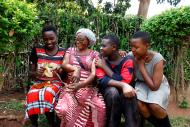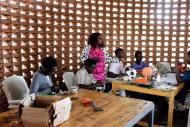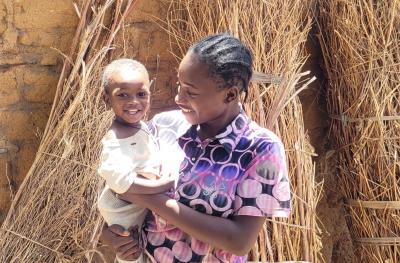
My name is Kakuze Marie Emerance. I am 48 years old, married, and have two children. I was born in Rubavu, Western Province, but now live in Nyamirama sector, in Kayonza district. I remember the genocide like it was yesterday; Rwanda descended into bloodshed, and I found myself trapped in the violence.
On April 9, 1994, my life and that of my family took a terrifying turn when armed militias descended upon our home in Rubavu, western province. Armed with machetes, they burned everything, including our house. They killed my father, his two brothers, my elder sister, and all her children and buried them in a communal pit. Fueled by the rhetoric of ethnic division between the Tutsis and the Hutus, neighbors turned against neighbors and friends against friends. Our once peaceful village was turned into chaos and bloodshed. My mother survived but was severely traumatized by the horrific attacks and she managed to flee to Lake Kivu.
With my siblings around me, we attempted to flee, seeking refuge in a place I thought was safe, the Nyamyumba sector in the Rubavu district. I had lived there before undertaking my internship. Unfortunately, it was not; one of my colleagues informed the militia that I was a Tutsi, and they searched for me, slashed my right arm with a machete, and hit my elbow with a hammer. They left me for dead, but I survived for the second time.
Those days were horrific. The militia systematically killed people. Men, women, as well as children were killed. Families were torn apart, parents slaughtered before their children, and many were forced to flee to neighboring countries.
Soon, the violence came to an end. With my family wiped out and no place to call home, I was deeply wounded. As years went by, I began to slowly rebuild my life. Though it was a sad time, I did not return to school. Instead, I had to step up and care for my sibling and mother, who had just returned from Congo.
During the aftermath of the tragic events in Rwanda, the community initiated various programs to help survivors to rebuild their lives. I collaborated with other survivors and shared messages of hope to promote healing and recovery from the traumatic experiences we had gone through during the genocide. In 2008, the Rwanda government introduced the traditional Judicial courts known as Gacaca, where the Hutu militia who killed our families and survivors started the reconciliation process. Initially, it seemed like an impossible task since some of the perpetrators were still in hiding while others were imprisoned. However, they eventually began to appear at the Gacaca sessions. Facing the perpetrators was not an easy decision to make, and it took me a long time to accept the eventuality.
In 2008, the local authority selected me, and I enrolled in the Women for Women International program, along with many other women survivors of the genocide. We found a safe space to share our experiences, and in our social modules, we were taught compassion and forgiveness.
Although I felt pain in my heart, I chose the path of compassion and reconciliation. Forgiving the perpetrators did not come easily, but eventually, I was able to forgive them and move on with my life.
Some of the women who participated in the Women for Women International program were Hutus. At times, I used to see them as murderers. However, as I continued attending the program sessions, I gradually realized that we all had different problems and challenges in life. With each passing week, my heart began to change as I became empathetic towards them. The program not only transformed my perspective but also my life. I also decided to visit prisoners in the Rubavu district during the juridical process. They confessed how they killed members of my family and torched our house and requested forgiveness, and I forgave them. Although the government promoted unity and reconciliation through the “NDI UMUNYARWANDA” (I am Rwandan) campaign, I realized the importance of focusing on humanity instead of perceiving individuals based on ethnicity after receiving the WfWI training.
Even though the people I forgave are still in prison, I have realized that I have the power to change my life and positively impact the lives of those around me. With support from the local authority in my area, I established a kindergarten school for vulnerable children. I am also a trainer at the Women’s Opportunity Center where I teach other women vocational skills. Additionally, I have been taking care of my two children and putting them through school. My eldest is 23 and about to start university, and I will do everything in my power to support him.
Despite being survivors of the genocide, we should not forget vulnerable women born to perpetrators of the genocide. I keep sharing the knowledge I gained from Women for Women International with other women, hoping to change their lives.


